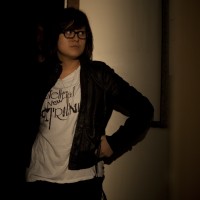 Born in Taiwan and raised in Melbourne, Corrie is a graduate of the prestigious VCA School of Film and Television. During her time there she wrote and directed Happy Country (2008) and Wonder Boy (2010). Both films have screened at numerous festivals both locally and internationally.
Born in Taiwan and raised in Melbourne, Corrie is a graduate of the prestigious VCA School of Film and Television. During her time there she wrote and directed Happy Country (2008) and Wonder Boy (2010). Both films have screened at numerous festivals both locally and internationally.
Corrie was selected for the Accelerator Talent Camp program at the 2009 Melbourne International Film Festival with Happy Country,and Wonder Boy made its international premiere at the prestigious Munich International Festival of Film Schools in 2011. She currently works with Sydney-based production house Staple Fiction, with whom she is developing a feature set in China, as well as being in development for another short. In her spare time she enjoys cold cuts, dumplings, and badminton. Which is not surprising then that in 2011 she is a recipient of Raw Nerve short film production initiative with her film, aptly titled Bruce Lee Played Badminton Too along with Producer Anna Kojevnikov.
1. What’s the greatest challenge to you as a practitioner?
Well, the boring thing to say is funding – getting the money to be able to make the projects you want to make. But I should probably be a bit more poetic about it, so – the biggest challenge for me is to remain fresh, positive, focused and motivated! Filmmaking is so self-driven; if I don’t have the motivation or desire to get out of bed every morning to write, research, and re-write, nothing will get done. And remaining positive is such an integral part as well – there’s nothing worse than suffering a bout of self-doubt and panic and the desire to want to throw a week’s worth of work away and start over. My advice – don’t! Always take a deep breath, step away for a day and do something else, before you go ripping anything apart.
2. When did you feel like you’ve ‘made it’ as a filmmaker?
Ha! Unfortunately this is still the holy grail that I’ve yet to achieve. I guess this question would be hard to answer in any profession – but especially in filmmaking as it’s might still be regarded as a “hobby” rather than a serious career but a lot of people. I guess a better way for me to look at this question is what will make me feel like I’ve “made it”. As storytelling is such an integral part of filmmaking, I think when I get to pick the stories I want to make, in the way I want to make it, free from any restrictions, that will be when I can sit back in my chair, light up a cigar and say to my pet monkey, ‘yup, I’ve made it’.
3. What was your goal when you made Wonder Boy?
My biggest passion in the shorts I’ve made is to tell real Asian stories on screen. Wonder Boy is about a ten-year- old Chinese boy’s attempt to define himself in a world he is still trying to make sense of. In an increasingly globalised and divided world, we continue to try to distinguish ourselves from each other as well as from the most quintessential part of ourselves – our heritage.
Clancy is growing up in an Australia that is tolerant and accepting of cultural diversity, he can go to Chinese schools on Saturdays and at attend regular primary school during the week. However, he is trapped in a curious dichotomy where he is not Chinese enough, but not quite Australian enough. My goal was to simply shed light on this largely ignored phenomenon of what identity means to the generations after us.
4. What do you hope audiences take away from the film?
Wonder Boy is not a message film. It is a film that asks questions, or rather, my own personal question – how necessary is self-acceptance in forming our own identiy? How are we expected to communicate with each other, when we live in a world that is made up of individuals who are so culturally different? And are we actually really that different, or have we been brought up to believe we are? Storytelling is about exploring other lives and asking these questions. I don’t always find the answers in the films I make, but there’s a joy and importance in simply asking them.
5. What are you currently working on?
Currently I’m co-writing a TV comedy series, as well as developing my short film, ‘Bruce Lee Played Badminton Too’, into a feature film.
6. What’s your impression of the Asian Film Forum and Network (AAFFN)? Where do you think the AAFFN should head to next?
It was a fantastic weekend and such a great and important initiative to start. I hope they can eventually turn it into a film festival that showcases not only Asian-Australian stories, but Asian stories from all around the world.

I think that for me this pushes at the crux of our “current” field (and perhaps broader? although astronomy is a funny little nook) issue. What is graduate school?